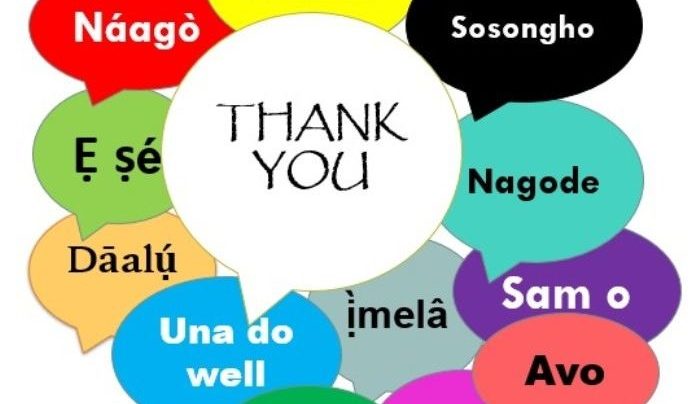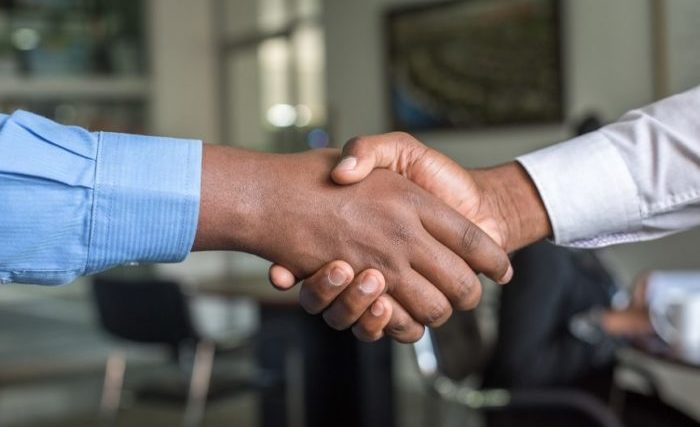Humans express gratitude in many ways other than one. However, there seems to be a universal gesture with which they express appreciation, which is the simple gesture of saying “thank you.” Although simple, it carries with it a huge import of meaning. But this easy gesture of saying “thank you” to show appreciation could be expressed in different ways in many languages of the world. Also, Nigerian languages have various ways to show gratitude or say thank you for either little everyday things or things of magnitude.
In Nigeria, the use of “thank you” can be noted in all sectors of daily activities; from the exchange between conductors and passengers in commercial vehicles to roadside food vendors, between elderly persons and younger people, at banks, markets, schools, petrol stations, high-class restaurants, places of worship, hospitals and academic environment in rural and urban communities. Although Nigeria has English as its official language, the country is highly diversified in cultures and, by extension, languages.
How The Word ‘Thank You’ Originated in Nigerian Languages
English remains the official language of Nigeria – a 923,768Km2 covered area nation that is made up of more than 500 distinct languages, spreading across the 36 states, which can be identified in the 6 geopolitical zones. In the English language, the foremost time thanks was used was in the 12th century. However, it didn’t translate exactly as thank you. The phrase has its root in the Latin word tongēre, which directly translates to “I will remember what you have done for me.”
Coming back to indigenous Nigerian languages, it is rather difficult to pinpoint the exact origin of thank you. This is because many of these languages may have their origin from other parts of Africa. Little wonder certain Nigerian languages can be identified in other countries across Africa and in parts of the world.
Thank you in Nigerian languages may be as old as the existence of many of these languages. Nevertheless, Nigerians do not only verbalize their gratitude but may show it nonverbally in their gestures, such as receiving gifts with both hands and kneeling or bending to receive things. Elders may choose to nod or give younger people a tap on the back. However, verbalizing gratitude is still seen as the best.
As old as the show of gratitude is in Nigerian languages, it is equally a long-standing tradition that it is rude to not appreciate people for being kind to you, giving you gifts, or service of any sort.
How To Say Thank You In Various Nigerian Languages

Hausa
- Na gode (Literally means I thank you)
- Allah ya ampana (May God make it useful): It is mostly used as a response after one receives gifts.
- Allah ya sa Alheri (Lit. means May God bless)
All the above can be used as ‘thank you.’ The response to all of them is Madalla. It is an acknowledgment that the respondent accepts the gratitude of the speaker of “thanks.”
One of the major languages in Nigeria, the Hausa language is a Chadic language spoken by the Hausa people. The natives of this language are mostly found in West Africa and in Nigeria; they are found in the Northern region of the country. The language is spoken by almost 100 million people as of 2015-2016.
Igbo
- Dàálụ́ (often used in Anambra and Enugu)
- Imeela (Lit. you have done well.) This is used in central Igbo.
- Imena
The response to thank you in Igbo is Nnoo (lit. Welcome). However, some speakers prefer to respond with ‘Ooo’ as an affirmation to the acceptance of the gratitude towards their gesture. Other responses could be Nsogbu adịghị or Nsogbu adịrọọ (lit. no worries).
Native speakers of Igbo are about 45 million. Igbo is an ethnic group of South-Eastern Nigeria, and it has a few speakers in the South-South geopolitical zone. The language has several dialects that include Waawa (found in Ebonyi State), Enuani (in Delta), Orlu (Imo State), Oyigbo and Ekpeye (Rivers State), and Ohafia (Abia State), among others.
Yoruba
- E ṣeun (said to older people as a sign of respect)
- O ṣeun (Can be said to one’s age mate or anyone who’s younger)
- O se (to age mate or younger)
- E se (to a person older than the speaker)
- Dúpẹ lọwọ (Thank)
- Dúpẹ lọwọ ti o (thank you)
Ko to pe (you’re welcome) is mostly the response to thank you in Yoruba.
As in many other languages in Nigeria, saying thank you is also important to the Yoruba people. Nevertheless, how to say thank you varies in their language according to how the recipient of the gratitude is either older or younger than the speaker.
The Yoruba language has native speakers in Southern Nigeria, Benin, Togo, The Gambia, and also a few speakers in Sierra Leone.
Fulfulde (Fula)
- Miyotti
- Miyotti sosai (thank you very much)
- Useko
- A jaraama (To one person)
- On Jaraama (to several people)
Native speakers of Fulfulde, which is also known as Fula, are called Fulani/Fula people. The language is spoken in about 20 countries in West and Central Africa. In Nigeria, the speakers are found in the Northern region.
Because Fula is a language of more than 65 million people and is found in different regions of Africa and Nigeria, there are many dialects of the language. As a result, there are several ways to say thank you in the different dialects.
Nigerian Pidgin (Broken English)

You do well (Lit. you have done well or well done)
Response to this is in a variety of ways but no wahala (translates to “no problem”) is the most widely used. How did Pidgin English adopt “you do well” as thank you? This is likely due to the language having a combination of Nigerian languages and English. Many Nigerian languages directly translate “thank you” as “you have done well” or “well done.” Hence, it was easy to adopt the same pattern.
The origin of Nigerian pidgin can be traced as far back as the 17th century following language contact due to trade between the British and indigenous people of Nigeria. The language soon rose to become the most popular and accepted language after the English language. Where there is a barrier in communication as caused by indigenous ethnic groups, the Pidgin English often comes to play.
Edo (Beni)
Ù rú èsé
Although it is difficult to trace how Ù rú èsé originated in Edo Language, it is one important phrase in the language alongside greetings.
Edo is a language spoken by the Edo people of Edo State in the South-South geopolitical zone of Nigeria. They are majorly found in the Benin Empire, which was previously known as Igodomigodo.
Tiv
M sugh u (Lit. I thank you)
The above can also mean sorry, hi, and welcome.
One of the Nigerian languages, the Tiv language is spoken in North-Central Nigeria in States such as Benue, Taraba, and Nasarawa.
Ebira
- Avo
- Nyaari emi (thanks for your support)
Ebira has two dialects, namely the Okene dialect and koto (okpoto) dialect. Native speakers of the language are found in Kogi State (North-Central), Nasarawa (North-Central) and Edo (South-South).
Ngas (Angas)
- Seyil (General way to say thank you)
- Nyha seyil (I thank you).
- Nyha Seyil ya (to a male)
- Nyha seyil yi ( to a female)
- Nyha seyil wun (to more than one person)
Ngas is also known as Angas language. Thank you in the Plateau language of the North-Central geopolitical zone has many forms. The language is a gender-sensitive one, and as a result, “thank you” has different ways it is said to a male/female and how it is said to a group of people.
Idoma
Anya
The response is also anya.
Idoma language considers it more appropriate to thank anyone who thanks you. For this reason, “anya” is responded with another “anya.” The language is native to the people of Benue State of North Central part of Nigeria.
Kanuri
Ardeneskin
This language is also found in Chad, Nigeria, Cameroon, parts of Libya, and Sudan. In Nigeria, it is one of the most spoken languages with more than 11 million speakers in the North-East region. The speakers are found in Borno, Yobe, and Adamawa States.
Berom
Mafeng
The word “thank you” in Berom language is also used as a name for both male and female. The Berom language has over a million speakers in the Plateau State of Central Nigeria.
Eggon
- Me vye no (I thank you)
- Me vye (I rejoice)
“Thank you” in the language portrays happiness as in Me vye or simply as thanksgiving as in Me vye no. The Eggon language is also known as Mada, and it is the major language of Nasarawa State, which is found in the North Central geopolitical zone of Nigeria. It is also found in parts of Kaduna (North West) and Benue (North Central).
Nupe
- Kubetuin (thanks)
- Kubetuin sereyin (thanks so much)
- woe kubetuin sereyin (thank you very much)
The word Nwage (alright) can be used as a response to thanks. However, it may not be the only response in the language.
The language has speakers in different Nigerian States, with its majority in Niger State (North-Central). States such as Kwara, Kogi, and the FCT have minority speakers of the language.
Efik, Ibibio, and Oron
- Sọsọñọ (singular)
- Esọsọñọ (plural)
- Sọsọñọ eti eti (thank you very much)
The response to both is Ọfọn o
Efik, Ibibio, and Oron are all different dialects. However, they have many similarities. Efik is found in Akwa Ibom State and Cross River (South-South). On the other hand, Ibibio is native to the Ibibio people of Akwa-Ibom and Abia State (South-East), while Oron is native to Cameroon, Akwa Ibom, and Cross River.
Miya
Mən goodèe súw
Thank you in Miya language may have a similar origin as many Afro-Asiatic/Chadic languages such as Hausa. As a result of a probable similarity of origin, thank you in the language has an independent word goodèe (thanks). The word is closely related to Hausa’s gode (thanks).
Miya is a language in Bauchi State (North East).
Gbagyi (Gwari)
Ma gode (I thank you)
Although a Nuoid language in the Niger-Congo language family, the language has come encounter with many languages in the North which may have resulted in language borrowing. Perhaps the language may have another way of saying thank you, the popular way is Ma gode. This is believed to have been borrowed from Hausa’s Na gode (thank you).
Gwari people can be found in Abuja, Niger, and the Nasarawa States in the North Central. It also has speakers in Kaduna State (North West).
Igede
obe
Igede language is closely related to Idoma. It is spoken in Benue State (North Central) and Cross River (South-South).
Ngizim
Ná goodoota-ngaa naa ci
It is an Afro-Asiatic/Shadic language spoken in Yobe State (North-East).
Yekhee (Afenmai)
Obekha
The Afenmai is a language found in Edo State.
Igala
- Agba
- Awa
- Nago
Agba can be used to reply to thank you in Igala.
Igala is a Yoruboid language with dialects such as Idah, Imane, Ife, Ogugu, Dekena, and Ibaji. The language is primarily spoken in Kogi State (North-Central).
Effium
Ahye
The respondent replies with anemo
The Effium language is mixed with Igbo and Korring-speaking ethnic group in Ebonyi State (South East) in a community that shares boundary with Benue State. Because it is a language under Igbo, Effium has many words and sounds alike with Igbo and Idoma.
Jukun
- Toobaa
- Igode
Thank in Jukun has two different forms. The language has speakers in Cameroon and Nigeria. In Nigeria, Jukun people are found in Taraba (North West), Benue, Nasarawa, and Plateau.
Shuwa-Arab (Baggara)
Shukran
The Shuwa-Arab is of Arab descent, and it is spoken in 7 different African countries, including South Sudan, Sudan, Chad, and Nigeria (in Borno and Yobe States). Also an Arabic dialect, thank you in Baggara (shukran) is derived from the Arabic word, Shukran, which literally means thanks.
Bura
- Usa
- Hu (to praise or thank)
Bura is a language in Nigeria spoken in the North East States such as Borno, Adamawa, and Yobe. The Language, which is also known as Babur, is believed to have originated from Yemen, but due to migration and language contact, it has lost many original words and vocabulary along the line.
Tyap
- Ngwai (thank you)
- Zî gwai gbådåndang (Thank You So Much)
The Tyap language is spoken by the Atyep people of Kaduna State (North West). It has many dialects that include Fantswam, Gworok, Takad and Tyuku, among others.
Kurama
- N’gode (singular)
- Ti’gode (plural)
“Thank you” in Kurama language changes its form when it is directed at a person and when directed to two or more people. Also, it is believed that due to language contact, it may have borrowed thanks (gode) from Hausa or another language closely related to Hausa. Although there may be other ways to say thank you in the language, N’gode and Ti’gode are the most popular. Kurama is mainly spoken in Kano (North West) and Kaduna States, with other speakers in Borno, Jigawa, Bauchi, and Plateau.
Urhobo
- vwhe kobiruo
- Mingwo or Migwo (can mean thank you, good morning, afternoon, and evening).
Urhobo belongs to the same language family as Edo (Bini) called the Edoid language of the Niger-Congo family. It is the major language in Delta State (South-South) and is related to Isoko (in Delta/Bayelsa States), and Esan and Afemai in Edo State.
Kana
Ɔràbòo
Kana is a language in Rivers State and the lingua franca of East Ogoni people.
Esan
Obulu Obhio
Esan is also an Edoid language native to the Esan people of Edo State. It has several dialects, which may have different ways of saying thank you. However, in a more general way Obulu Ohio is how to say thank you in the language. Dialects of the language include Ogwa, Ewu, Ugboha, Uromi, and Ewohimi, among others.
Ijaw
Emiyenkah
Ijaw is also spelt Ijọ and is spoken in the South-South geopolitical zone in Rivers, Delta, Edo, Bayelsa, and the South West State- Ondo. Ijaw has many dialects in different places it is spoken, and these dialects also have a variety of ways to say “thank you.”
Izon
- Ubana or umbana
- Nua (apart from “thank you,” it is also a greeting that means welcome).
- Nua kule (give thanks)
Izon is the dominant Ijaw language, and it is spoken by many Ijaw speakers. The language has about 30 dialects, which may have several other ways of saying “Thank you.” The language is an Ijoid language found in Edo, Ondo, Bayelsa and Delta States.
